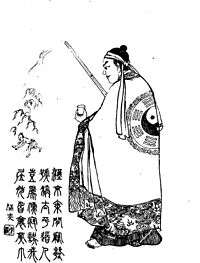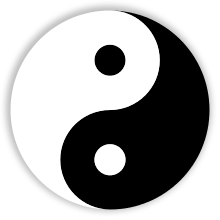Zhang Jue
| Zhang Jue / Zhang Jiao 張角 Great Teacher (大賢良師) General of Heaven (天公將軍) | |
|---|---|
 A Qing dynasty illustration of Zhang Jue | |
| Born |
Unknown Ningjin County, Hebei |
| Died |
184[1] Guangzong County, Hebei |
| Relatives |
|
| Part of a series on |
| Taoism |
|---|
 |
|
Deities |
|
Holy places |
|
Organisations |
| Portal Taoism |
Zhang Jue (/ˈdʒɑːŋ
Yellow Turban Rebellion
Giving himself the title of "Great Teacher" (大賢良師), Zhang Jue led the Yellow Turban Rebellion with his younger brothers Zhang Bao (張寶) and Zhang Liang (張梁) in a campaign called the "Way of Heaven" or "Way of Peace". He and his brothers gave themselves titles: Zhang Bao was the "General of Land" (地公將軍), Zhang Liang was the "General of the People" (人公將軍); and Zhang Jue was the "General of Heaven" (天公將軍).[2] The Yellow Turbans claimed to be Taoists, and rebelled against the Han dynasty in response to burdensome taxes, rampant corruption, and famine and flooding, which were seen as indications that the Han emperor had lost the mandate of heaven.
The Yellow Turbans conquered much in the early years of the rebellion, but later could not hold out against Han imperial forces led by He Jin, Lu Zhi, Dong Zhuo, Huangfu Song, Zhu Jun and others. Although the Yellow Turbans still remained capable even in face of their more powerful foe, they were nonetheless torn apart upon the death of their leader, Zhang Jue, and were eventually defeated and dispersed. Zhang Bao was defeated and killed by imperial forces led by Huangfu Song and Guo Dian (郭典) at Xiaquyang County (下曲陽縣; west of present-day Jinzhou, Hebei),[3] while Zhang Liang also met his end at the hands of imperial forces led by Huangfu Song at Guangzong County (廣宗縣; southeast of present-day Guangzong County, Hebei).[4]
Large groups of Yellow Turbans roamed through China for years after the rebellion's defeat, most of them eventually joining the army of the warlord Cao Cao, whose agrarian reform policies closely matched Zhang Jue's own programme.[5]
In Romance of the Three Kingdoms
Zhang Jue is also featured in the 14th-century historical novel Romance of the Three Kingdoms. He is introduced in Chapter 1 as follows:
At that time, there lived three brothers in Julu Commandery: Zhang Jue, Zhang Bao and Zhang Liang. Zhang Jiao was a failure in the county level examination. He had gone into the mountains to gather some medicinal herbs, when he came across an old man; the old man had a youthful countenance, and was carrying a fat-hen walking stick. The old man beckoned Jue into a cave, presented him with a book in three volumes which had come from the heavens, then said, "This book is called The Essential Art of Great Peace. Once you have mastered its contents, you will represent the heavens in spreading this knowledge, and thereby save all of mankind. If you start to have second thoughts, there will be terrible consequences for you." Jue enquired as to the old man's name. The old man said, "I am the old immortal spirit from the southern lands."[6] With that, the old man vanished into thin air. Upon receiving this book, Jue practiced night and day. Eventually, he could summon the wind and rain, and came to be known as the Great Peace Taoist. (Wikisource translation)
Zhang Jue then goes on to start the Yellow Turban Rebellion with his brothers. Little time is devoted to Zhang Jue in the book, and his death is given a line in the second chapter: "Zhang Jue had died before his (Huangfu Song's) arrival." In the novel, Zhang Bao does not die in battle against imperial forces, but meets his end at the hands of a subordinate, Yan Zheng (嚴政), who cuts off his head and surrenders to imperial forces.[7]
In popular culture
Zhang Jue appears as a playable character in Koei's Dynasty Warriors and Warriors Orochi video games series, as well as serving as an antagonist in Capcom's Destiny of an Emperor for the Nintendo Entertainment System. He is referred to as "Zhang Jiao" in these games. He is also seen as one of the antagonists of the light gun shooting game SEGA Golden Gun.
See also
References
- 1 2 de Crespigny (2007), p. 1058.
- ↑ (角稱「天公將軍」,角弟寶稱「地公將軍」,寶弟梁稱「人公將軍」, ...) Houhanshu vol. 71.
- ↑ (嵩復與鉅鹿太守馮翊郭典攻角弟寶於下曲陽,又斬之。) Houhanshu vol. 71.
- ↑ (嵩與角弟梁戰於廣宗。梁眾精勇,嵩不能剋。明日,乃閉營休士,以觀其變。知賊意稍懈,乃潛夜勒兵,雞鳴馳赴其陳,戰至晡時,大破之,斬梁,獲首三萬級,赴河死者五萬許人,焚燒車重三萬餘兩,悉虜其婦子,繫獲甚眾。) Houhanshu vol. 71.
- ↑ Pletcher, Kenneth (2010). The History of China. New York: Rosen Publishing. ISBN 9781615301096.
- ↑ Another name for Zhuangzi. After his death, Zhuangzi was deified by his followers. They said that he would later travel to the north, and ascend to the heavens as an immortal in a blaze of fire. In the first year of the Tianbao era (742), Emperor Xuanzong of Tang gave Zhuangzi the appellation true man from the southern lands. (三國演義校注, page 10, note 24, ISBN 978-957-9113-05-2)
- ↑ (賊勢危急,賊將嚴政,刺殺張寶,獻首投降。) Sanguo Yanyi ch. 2.
- Chen, Shou (3rd century). Records of the Three Kingdoms (Sanguozhi).
- de Crespigny, Rafe (2007). A biographical dictionary of Later Han to the Three Kingdoms (23–220 AD). Leiden: Brill. ISBN 978-90-04-15605-0.
- Fan, Ye (5th century). Book of the Later Han (Houhanshu).
- Luo, Guanzhong (14th century). Romance of the Three Kingdoms (Sanguo Yanyi).
- Pei, Songzhi (5th century). Annotations to Records of the Three Kingdoms (Sanguozhi zhu).